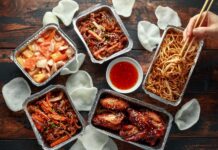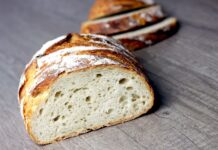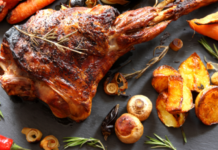Brits are being encouraged to pay attention to the order they eat their food in to balance their blood sugar and improve digestion.
Health and nutrition experts from Prepped Pots powered by MuscleFood.com have provided their top tips on which foods should be eaten first and which should be saved for later.
Eating in a certain order can be a game-changer when it comes to preventing blood sugar spikes and crashes.
Research has revealed that following the right food order can reduce the glucose spike of a meal by a staggering 75%*.
Ideally, people should start their meal with non-starchy vegetables, eat protein and fats second and finish with carbohydrates.
Following this sequence will make you feel fuller for longer compared to eating the same exact foods in reverse order.
That’s because having protein, fibre and healthy fats first slows down the release of sugar from simple carbs.
If you start with starches and sugars then they are quickly broken down into glucose, leading to a rapid increase in post-meal blood sugar levels.
Short-term symptoms of glucose spikes are constant cravings, chronic fatigue, poor sleep and brain fog, but they can also lead to long-term issues like acne, arthritis, infertility, type 2 diabetes and mental health problems.
Maintaining balanced glucose levels improves mood and energy levels, keeps away hunger pangs and helps manage weight.
Ashleigh Tosh from Prepped Pots powered by MuscleFood.com said: “For a long time, managing blood sugar levels was considered a concern only for diabetics, however being on a constant glucose rollercoaster can affect anybody.
“By eating in the right order, you are prioritising foods that slow down digestion and reduce the impact on blood sugar levels.
“Being strategic with your eating means that you can make yourself feel full for a longer period of time and avoid cravings.
“Even if you don’t want to separate your meals into different food groups, just having a veggie starter still has a massive impact, as fibre makes it more difficult for glucose to make its way to your bloodstream.”
Here are food hacks to prevent blood sugar spikes from the team at Prepped Pots powered by MuscleFood.com:
- Line your stomach with fibre and protein
You don’t have to cut out starches and sugars from your diet to prevent glucose spikes. The order in which you eat your meal can be just as important as what’s on your plate. There are no good or bad foods, however, it’s recommended that you consume vegetables, protein and healthy fats before indulging in carbs. This way you’ll be contributing to a slower and steadier release of glucose into the bloodstream.
- Avoid bread before dinner
When you go to a restaurant it’s common to get some complimentary bread while you’re waiting for your dinner. Although it may be appealing, it can result in a big glucose spike, as you’ll be consuming starch on an empty stomach. If you wait to eat the bread alongside your protein, fats, and vegetables then you can significantly flatten the glucose curve.
- Have a vegetable starter
A vegetable starter is a good alternative to bread or other snacks if you’re feeling peckish and are waiting for your food to be ready. If you can’t or don’t want to eat your meal in a certain order then just opt for a starter that includes non-starchy vegetables like leafy greens, and eat the rest of your meal normally.
- Drink diluted vinegar before a meal
Drink a tablespoon of regular or apple cider vinegar in a tall glass of water just before tucking into your meal. This simple trick can play a big part in keeping away post-meal cravings. That’s because the acid in vinegar helps slow down the breakdown of carbohydrates.
- Sweet beverages
Don’t forget that sugary beverages can also spike your blood sugar. If you wish to enjoy a delicious soda or sweet tea then it’s best to save it as a treat after you’ve had your meal. Try to opt for water or Seltzer water, green tea, milk alternatives or a green smoothie instead.
- Savoury breakfast over sweet
The meal you have first thing in the morning affects your glucose levels for the rest of the day. Try to avoid sugary breakfasts like pancakes, waffles, porridge with syrup or muffins. The best foods to have in the morning on an empty stomach are eggs, Greek yoghurt, tofu, meat, fish, cheese, cream cheese, protein powder, nuts and seeds.
- Move after a meal
Even a little bit of exercise after eating reduces the accumulation of glucose in the body. Whether you go for a 10-minute walk or do some yoga or stretching in your living room, you’ll be preventing cravings and snacking post-meal. Blood sugar levels usually spike 60 to 90 minutes after eating, so it’s best to move your body soon after finishing a meal.
Help keep news FREE for our readers
Supporting your local community newspaper/online news outlet is crucial now more than ever. If you believe in independent journalism, then consider making a valuable contribution by making a one-time or monthly donation. We operate in rural areas where providing unbiased news can be challenging. Read More About Supporting The West Wales Chronicle


























I’ve been eating ok for 55 years thanks more claptrap